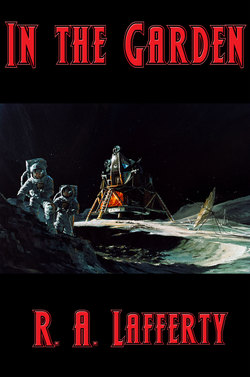Читать книгу In the Garden - R. A. Lafferty - Страница 4
На сайте Литреса книга снята с продажи.
In the Garden
ОглавлениеIt Was a Dull, Routine Little World. It Didn't Even Have a City. Everything it Had Was in the Garden.
The protozoic recorder chirped like a bird. Not only would there be life traces on that little moon, but it would be a lively place. So they skipped several steps in the procedure.
The chordata discerner read Positive over most of the surface. There was spinal fluid on that orb, rivers of it. So again they omitted several tests and went to the cognition scanner. Would it show Thought on the body?
Naturally they did not get results at once, nor did they expect to; it required a fine adjustment. But they were disappointed that they found nothing for several hours as they hovered high over the rotation. Then it came, clearly and definitely, but from quite a small location only.
“Limited,” said Steiner, “as though within a pale. As follow the rest of the surface to find another, or concentrate though there were but one city, if that is its form. Shall we on this? It’ll be twelve hours before it’s back in our ken if we let it go now.”
“Let’s lock on this one and finish the scan. Then we can do the rest of the world to make sure we’ve missed nothing,” said Stark.
There was one more test to run, one very tricky and difficult of analysis, that of the Extraordinary Perception Locator. This was designed simply to locate a source of superior thought. But this might be so varied or so unfamiliar that often both the machine and the designer of it were puzzled as how to read the results.
The E. P. Locator had been designed by Glaser. But when the Locator had refused to read Positive when turned on the inventor himself, bad blood developed between machine and man. Glaser knew that he had extraordinary perception. He was a much honored man in his field. He told the machine so heatedly.
The machine replied, with such warmth that its relays chattered, that Glaser did not have extraordinary perception; he had only ordinary perception to an extraordinary degree. There is a difference, the machine insisted.
It was for this reason that Glaser used that model no more, but built others more amenable. And it was for this reason also that the owners of Little Probe had acquired the original machine so cheaply.
And there was no denying that the Extraordinary Perception Locator (or Eppel) was a contrary machine. On Earth it had read Positive on a number of crack-pots, including Waxey Sax, a jazz tootler who could not even read music. But it had also read Positive on ninety percent of the acknowledged superior minds of the Earth. In space it had been a sound guide to the unusual intelligences encountered. Yet on Suzuki-Mi it had read Positive on a two-inch long worm, one only out of billions. For the countless identical worms no trace of anything at all was shown by the test.
So it was with mixed emotions that Steiner locked onto the area and got a flick. He then narrowed to a smaller area (apparently one individual, though this could not be certain) and got very definite action. Eppel was busy. The machine had a touch of the ham in it, and assumed an air of importance when it ran these tests.
Finally it signaled the result, the most exasperating result it ever produces: the single orange light. It was the equivalent of the shrug of the shoulders in a man. They called it the “You tell me light.”
So among the intelligences on that body there was at least one that might be extraordinary, though possibly in a crack-pot way. It is good to be forewarned.
